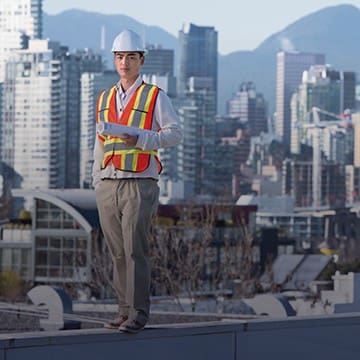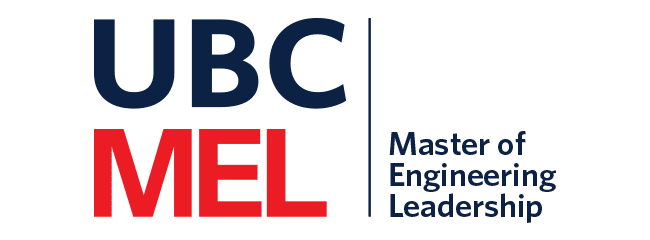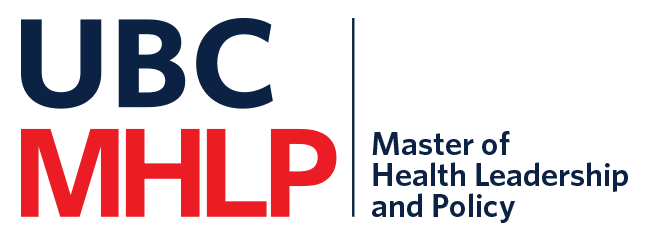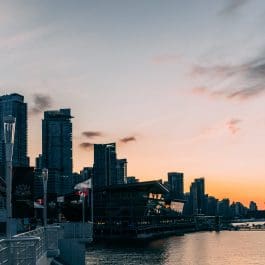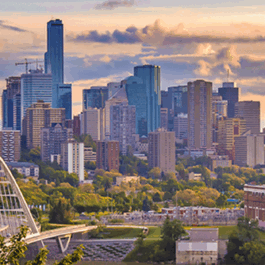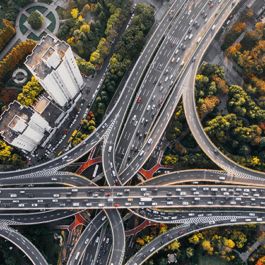
Panel Discussion – Adapting to the Pandemic
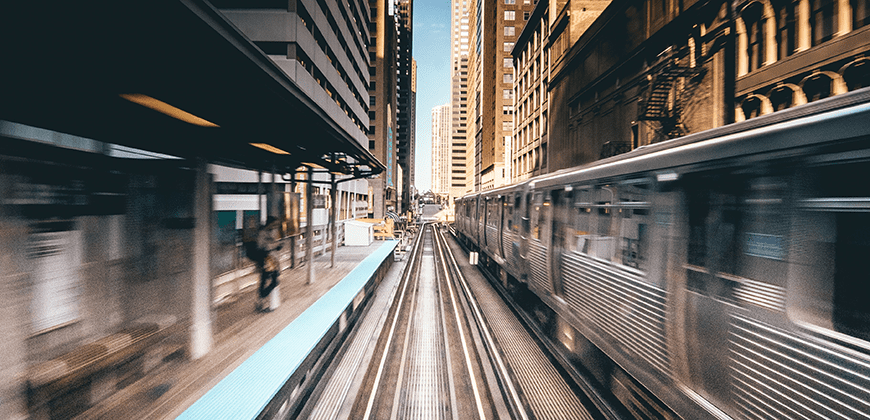
On June 4, leaders from across different urban industries came together to discuss the challenges and opportunities that the unprecedented COVID-19 pandemic has provided to their companies. MEL students in Urban Systems were invited to gain key insights into how industry leaders are adapting to the pandemic, and learn how British Columbia’s urban future might shift as a result of these changes.
Panelists:
- Lloyd Bie, Director of Transportation, City of Richmond
- Dr. Elizabeth Saewyc, Director, School of Nursing, UBC
- Dave Eto, Board Member, BC Food & Beverage and Chief Transformational Officer, Sunrise Soya Foods
- Peter Navratil, General Manager, Liquid Waste Services, Metro Vancouver
- Graham Fenwick, General Manager, BC Hydro
Question: Considering your areas of expertise, what will be the biggest challenge in terms of recovering from the pandemic?
Lloyd Bie: Transportation changed drastically, in an extremely short amount of time. Perhaps the most significant challenge we are facing is cost; with transit supported by the fare box, low rates of ridership are concerning but impossible to avoid due to social distancing measures.
We have to explore how we might do things differently in the future. We cannot predict when, or really, if, things will return to “normal.”
Traffic patterns very well might change permanently.
Dave Eto: While people can avoid public transit, people cannot live without food. Continuing to manufacture food products in times of social distancing was a challenge. Creating safe working conditions was difficult considering that production lines are designed for close proximity. We quickly adapted by installing plastic curtains between workers and immediately ceased working in small manufacturing facilities. We have also had to face our privilege head-on: many people can avoid public transit, must most of our employees are immigrants that rely on transit, even amidst a pandemic. We recognize that we are subjecting our employees to a lot of harsh realities that many of us do not have to face. One benefit, however, is that you’ve probably never had cleaner or safer food in your life. The pandemic has encouraged higher levels of automation in food, unfortunately, which has Reduced labour requirements, typically, immigrants. As we’ve seen with other food processing plants, such as United Poultry—which is only two blocks away from Sunrise Soya—our employees are at a high risk of having an outbreak of the illness. This is a huge issue in food processing, but we are managing it very well.
Graham Fenwick: We are seeking to increase our workspace and limit contact between employees. To do this, we’ve created teams of 5 pods, purchased additional spaces, and are seeking new spaces. To reduce the risk of an outbreak, we are having the entire pod self-isolate if one member becomes sick. We will bring in a new pod to replace those isolating. COVID-19 had us change our entire work process extremely quickly. With additional cleaners, for instance. Luckily, we have a lot of protective equipment and were well-equipped in that regard. It’s been a long 3 months. Essential services have to adapt—we have no other option!
Elizabeth Saewyc: We plan for disasters such as pandemics, but we hope they never ever happen. I believe that BC responded amazingly well to the current crisis. Our province has really stepped up and trusted the health professionals like Dr. Bonnie Henry to provide evidence-based suggestions and guidance, and to implement good solutions. We have had a less severe course, so far, due to the huge amount of planning. In the health sector, the same concerns exist about transportation challenges.
Much of community health care became telehealth – but this wasn’t possible in hospitals. We had to reorganize hospitals massively very quickly.
The thing that keeps me up at night is that while recognizing that we all could cope with this, 3 months and counting, the reality is that people who have chronic health conditions are not getting the care they need because we have had to postpone surgeries and care. We will see a second wave of chronic health conditions worsening because they didn’t get the care they needed. Also, long-term care facilities are a significant issue. It is especially difficult to manage physical and social distancing for those with dementia. We have had some very concerning outbreaks in these facilities, despite our excellent response compared to other parts of the world. Until 60-70% of our population have had and recovered from COVID-19, or until there is a vaccine, we will be in this position. This is a marathon, not a sprint—but it creates significant challenges around physical and mental health.
Peter Navratil: It took some time to ensure we were implementing a phased approach that aligned with the recommendations from the City of Vancouver so that we could avoid any spread of the illness through our plant. What will keep me up tonight is our budget meeting with the government tomorrow to see what investments will be in our sewage system for 2021. I will have to adapt somehow so that we can continue to provide essential services in a disrupted economy. Our environmental management and quality control folks are working very closely with UBC and BCCDC to develop a technology to detect COVID-19 in sewage as an early warning system. We are very proud of these innovations.
Question: What departments took the lead in planning and setting up new systems?
Lloyd Bie: Municipalities do a lot of different things. Our corporate leadership began by identifying what was clearly impacted, and what was not. Some areas were very easy to move online, and some were not possible. It’s a very broad organization, so it differed greatly. I think at the end of the day the people who saved us were the IT teams, who moved our entire organizations online in a short span of time.
Dave Eto:
We had an action plan live and updated, and we developed a task force around it. You have to plan for these things, even if you hope they never happen.
What began as a COVID-19 committee has changed to occupational health committee. Frankly, this has improved and tightened things up for us very quickly.
Elizabeth Saewyc: What I’m hearing so far, is very similar to what happened in health care and at the university: identify emergency operations, pull out those plans and assess. Those in leadership positions had to quickly brush up on “crisis communications”—brief, honest, clear, and empathetic communication. This crisis also unified us. For example, Schools of Nursing across the province were connecting to figure out how to offer placements to nursing students.
We used this to learn from each other and apply the solutions locally. Communication has been an important piece in every step of this.
Peter Navratil: To be honest, we had a strong plan in place for a crisis such as this. One issue we had was that were a little lean in terms of emergency response. However, many good things have come of this, such as opportunities for more conversation. The HR and Corporate Safety folks really helped us to move forward and provide our supervisors with the tools they needed to be successful. They allowed us to manage it appropriately when people felt unsafe.
Question: What changes to the transit system are expected post-pandemic? For example, concerning ridership and design?
Lloyd Bie: That’s the big question! TransLink is really wrestling with this right now, especially with services cut back due to low ridership. We are trying to ramp ridership back up, but people are nervous about getting on public transit. So, we don’t have any definitive answers yet. We have to monitor the situation and see how it all moves forward. Currently, we are striving to get transit up and running at two-thirds capacity; this is going to be a problem financially in the medium term.
Another thing to keep in mind is that challenges differ from city to city.
For example, Hong Kong took about five years to get its ridership back in order after last public health crisis. I was in Japan recently and it became really clear to me that Asian countries are much better prepared for the pandemic at a corporate and individual level. For example, individuals are all prepared with masks especially on transit. We may need to change the way we ride the bus, and North Americans may have to get used to this.
Question: What long-term effects on automation are expected?
Dave Eto: Simply put: some processes can be automated, but some cannot. We will begin to see automatic, robotic systems. But many of our systems rely on people putting food into packages, and this is very expensive to automate. So, automation of these systems will take time. Food manufacturing is one of the largest employers in Canada, contributing over $115B to this sector. Automation puts these jobs at risk, and I find it very concerning.
As Canada turns towards automation, we will be forced to automate these jobs eventually.
Question: Are the wastewater treatment plans in BC equipped with remote access to control the process?
Peter Navratil: My staff is telling me that we could, but it would be difficult in the long term. We need to adjust, test and work on a continual basis. We run automatically on the weekends, and we could continue that but in the short term only.
Have you had trouble getting supplies across the border? What has been the impact of the closed borders?
Peter Navratil: Closed borders have been challenge for a number of our projects. We have begun working with local contractors in Maple Ridge, but we’ve had to consider how can we use local suppliers. We’ll have to adapt, somehow.
Graham Fenwick: Equipment such as transformers and breakers are difficult to get, except from overseas. Further, we often bring in specialists to work on our projects, but they have been unable to travel. We have been bringing some of them in and having them isolate for 14 days, before we can proceed with the project. It’s definitely a large setback.
As the discussion above highlights, industries must be both prepared and flexible when facing challenges, especially challenges as transformative as the COVID-19 pandemic.
UBC’s Master of Engineering Leadership Students in Urban Systems learned much from the panelists on how the synergistic interaction of clinical, technical, and business skills is required to navigate uncertain times. Are you looking to gain both the technical skills and fundamental business knowledge necessary to become a leader in your field? Explore your options in the Master of Engineering Leadership.
Urban Systems
Application Deadlines
The online application portal for the January 2025 has closed.
Get ready to apply!
Admissions for the 2026 intake will open on January 1, 2025.
How to ApplyFeatured Faculty and Staff

Dr. Elizabeth Saewyc
Selected Articles
Featured Alumni
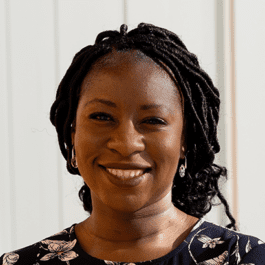
Daphne Mazarura
For Daphne Mazarura, the MEL in Urban Systems has expanded her education and professional experience in planning, giving her the technical knowledge to implement sustainable solutions in urban infrastructure projects.
